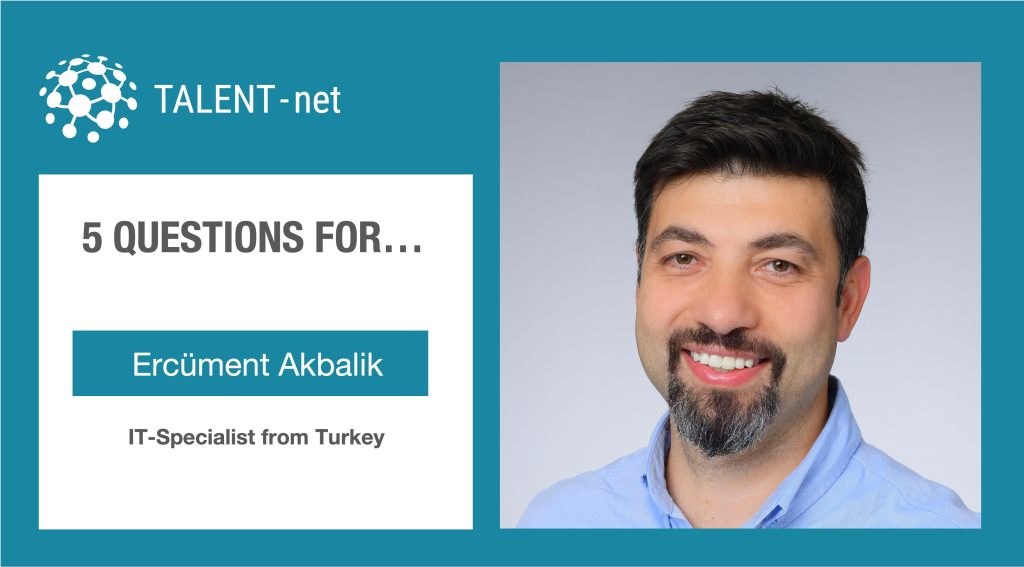
Blog
Qualified employees from abroad: What hurdles, risks and opportunities we have to face? – An interview with IT specialist Ercüment Akbalik from Turkey

“With the right strategy, companies can only benefit from an integrative and flexible approach – with a view to work culture and global competitiveness.”
Ercüment Akbalik works in a leading position as an IT specialist. He has lived in Bergisch Gladbach for 5 years and is originally from Turkey.
TALENT-net:
Ercüment, thank you very much for taking the time to talk to us today. We know that you are an IT expert and come from Turkey. First, tell us a few words about yourself and explain when and why did you make the decision to come to Germany?
Ercüment Akbalik:
Hello, and thank you for having me. I graduated with a degree in Mathematics and later pursued an MBA, which laid a strong foundation for my professional career that began in 2020. Since then, I have been actively engaged in various roles across different sectors, including the stock exchange, research, and insurance industries. Notably, I’ve had the opportunity to work with international companies, which have been instrumental in broadening my global perspective.
My professional journey has been diverse, starting from IT specialist roles and evolving into managerial positions. This progression has allowed me to develop a robust skill set, particularly in Microsoft technologies. Over the last decade, my focus has been primarily on Active Directory, Microsoft Exchange, Azure, and M365. These experiences have not only honed my technical abilities but also enhanced my adaptability and problem-solving skills in fast-paced and varied environments.
In 2017, I made the significant decision to relocate to Germany, primarily motivated by the educational prospects for my children. I was well aware of the high quality of German schools and the overall standard of living in the country, which I found very appealing. Another factor that played a crucial role in our decision was our concerns about earthquake risks in Istanbul, where we previously resided.
Additionally, having my brother and his wife already living in Germany greatly influenced our choice. Their presence here provided a sense of familial support and comfort, which was vital in making such a substantial move. Without their presence, it’s possible that we might not have taken this significant step. So, in essence, it was a combination of seeking a better quality of life, educational opportunities for my children, and the presence of family that guided our move to Germany.
TALENT-net:
What hurdles did you encounter? How or with what help did you overcome this?
Ercüment Akbalik:
Adapting to life in Germany was both challenging and educational for me. Despite being well-educated and possessing years of experience in my field, I encountered numerous rejections in my job applications, which I hadn’t anticipated. I was engaging in one or two interviews daily, and while they seemed to go well, the outcomes were often disappointing rejections, primarily due to my German language proficiency. This situation was quite demoralizing and impacted my motivation significantly.
Another challenge was the lack of awareness among some companies regarding the Blue Card visa. As an IT professional, I was eligible for this visa, which allows highly educated non-EU professionals to work in Europe without the need for company sponsorship or extensive paperwork. However, some employers were not familiar with this, which added to the hurdles I faced.
Recognizing that my German language skills were a primary barrier, I decided to focus on learning the language first. To facilitate this, I applied for a Job Search Visa, which allows me to stay in Germany for six months. During this period, I could not only search for jobs but also attend language courses. Throughout this journey, the support from my brother and Bahar was invaluable. They were a constant source of motivation and provided essential guidance, helping me navigate through these challenges. Their support made a significant difference in my adaptation process, both professionally and personally.
We crafted a compelling motivation letter for the German consulate, highlighting my background, reasons for moving to Germany, and the rejections I faced due to my German language skills. I included evidence of my expertise like training courses, certificates, blog pages, and the rejection letters stating the need for better German proficiency. Additionally, I demonstrated my financial stability to support myself for six months in Germany.This well-prepared application was crucial, and it wasn’t long before I received the visa.
However, before I could move, I received an offer from a big company in Munich, which led me to apply for a Blue Card visa instead. Obtaining the Blue Card visa was a smooth and relatively quick process for me. Since I already had a job offer in hand, and the offered salary met the Blue Card requirements, securing the visa was straightforward. The presence of a clear job contract and meeting the salary criteria streamlined the visa application, making it an easier and hassle-free experience.
With the job in Munich, I faced a new challenge. My family had to decide between living in Munich, where I would work, or in Cologne, close to my brother and Bahar. We chose Cologne for the family support, which meant I had to commute weekly between Munich and Cologne. It was a difficult period, living apart from my family during the week.
After nine months in Munich, my job search led me to an interview with a prominent IT Managed Service company, known for providing a wide range of IT support to various businesses. The interview process went exceptionally well, leaving me hopeful. The headhunter even called me afterward to express how impressed the company was with my knowledge and skills. They hinted at a strong possibility of a job offer by Monday, and I was thrilled at the thought of finally being able to relocate closer to my family.
However, the excitement turned to disappointment on Monday. I received an email from the headhunter, delivering the unexpected news that the company had decided not to hire me. The reason cited was their concern about the insufficient number of English-speaking customers they had, which they believed wouldn’t allow for full utilization of my skills. This was a significant setback, especially after the positive feedback from the interview
Faced with the setback of not being hired due to language concerns, I responded proactively. I crafted an email in English, articulating how my skills perfectly aligned with their needs, and then translated it into German using Google Translator. This email was more than just a message; it showcased my proficiency in English, my commitment to improving my German skills, and my adaptability in a multilingual environment. I directly addressed their concerns, offering practical solutions like using translation tools, while emphasizing my ongoing efforts to learn the language.
At the end of the email, I included a strategic message: ‘If you understand what I wrote with the translated language, I’m sure that your customers will understand too.’ This line was pivotal, highlighting that effective communication is possible even with language barriers. My initiative and creative approach led to a change in the company’s perspective. They were impressed and invited me for another interview, which focused on my adaptability and problem-solving skills.
This approach ultimately resulted in a successful outcome, securing me the position and demonstrating the power of proactive communication and resilience in overcoming challenges My tenure at this company lasted five years, during which I was promoted to a team leader position. Interestingly, my manager later admitted that his initial hesitation was due to his own lack of confidence in English, not my German skills. My hiring marked a turning point for the company, as they began to embrace more English-speaking employees, breaking down language barriers and prejudices.
This experience taught me the importance of persistence, effective communication, and the willingness to challenge preconceptions, both my own and others’. It highlighted the power of taking proactive steps and seeking support from those around you, like family and mentors.
TALENT-net:
What advices can you give applicants from abroad?
Ercüment Akbalik:
If you’re considering moving abroad for professional opportunities, especially to a country like Germany, here are some key tips to keep in mind:
Language Proficiency: While English might be widely accepted in professional environments, having a basic understanding of the local language, in this case, German, can be crucial. It not only helps in your job applications but also assists in integrating into the society and culture. Consider investing time in learning the language before or immediately after your relocation.
Understanding Visa Requirements: Familiarize yourself with the different types of visas, such as the Job Search Visa and the Blue Card visa. Understanding these requirements and the application process will be vital. Prepare thoroughly for your application, including motivation letters and proof of expertise and financial stability.
Persistence in Job Search: Rejections are part of the process. Don’t be disheartened by them. Instead, use them as learning experiences to improve your applications and interviews. Be open to feedback and continuously refine your approach.
Networking and Support: Leverage the support of friends, family, or acquaintances already living in the country. They can provide valuable insights, emotional support, and practical help. Networking can also open up job opportunities that may not be advertised publicly.
Cultural Adaptation: Be prepared for cultural differences in the workplace and society. Understanding and adapting to these differences can be crucial for your professional success and personal comfort.
Overcoming Prejudices: If faced with prejudices or misunderstandings, especially regarding language barriers, address them proactively. Your approach can include demonstrating your skills, willingness to learn, and finding creative solutions to overcome potential communication gaps.
Legal and Contractual Knowledge: Have a clear understanding of your employment contract, local labor laws, and rights. This knowledge can prevent misunderstandings and ensure a smooth professional journey.
Balance between Professional and Personal Life: If you have a family, consider their needs and support systems in your decision-making process. The well-being of your family is as important as your professional success.
Being a Pioneer: Be open to the idea that you might be setting a precedent in your workplace, especially if you are among the few non-native speakers or international employees. Your success can pave the way for others.
Seeking Professional Help When Needed: Don’t hesitate to seek help from professional services for aspects like job applications, language training, or legal advice. Professional guidance can sometimes make a significant difference.
TALENT-net:
What do you wish from companies in Germany regarding the hiring of foreign professionals?
Ercüment Akbalik:
In light of my experiences and the broader context of global talent acquisition, I have a few suggestions for companies in Germany regarding the hiring of foreign professionals:
Awareness and Acceptance of Diverse Qualifications: Companies should recognize and value the diverse educational backgrounds and professional qualifications that international candidates bring. Understanding the equivalence of foreign degrees and experiences can help in evaluating the true potential of candidates.
Language Flexibility: While the proficiency in the German language is important, companies could benefit from being more flexible with language requirements, especially in fields where technical expertise is more critical than linguistic prowess. This flexibility can include providing language training to employees and adapting to a more bilingual work environment.
Understanding Visa Regulations: Companies should be well-informed about visa regulations, such as the Blue Card system, to streamline the hiring process. This knowledge can help them tap into a larger pool of international talent without the misconception of complex sponsorship processes.
Inclusive Recruitment Practices: Adopting inclusive recruitment strategies that accommodate non-native speakers and international applicants can significantly enhance a company’s talent pool. This includes conducting interviews in a manner that assesses skills and potential beyond just language proficiency.
Support Systems for Relocation and Integration: Providing support for relocation, such as assistance with finding housing, understanding local laws, and integrating into the community, can greatly ease the transition for foreign professionals and their families.
Mentorship Programs: Establishing mentorship programs where foreign professionals are paired with experienced colleagues can facilitate smoother integration into the company and local culture.
Proactive Response to Prejudices: Companies should actively work to break down any prejudices or stereotypes within the workplace, ensuring that all employees, regardless of their background, feel valued and respected.
In summary, companies in Germany could greatly benefit from adopting a more inclusive, flexible, and supportive approach when it comes to hiring foreign professionals. This not only enhances the work culture but also contributes significantly to the company’s global competitiveness.




